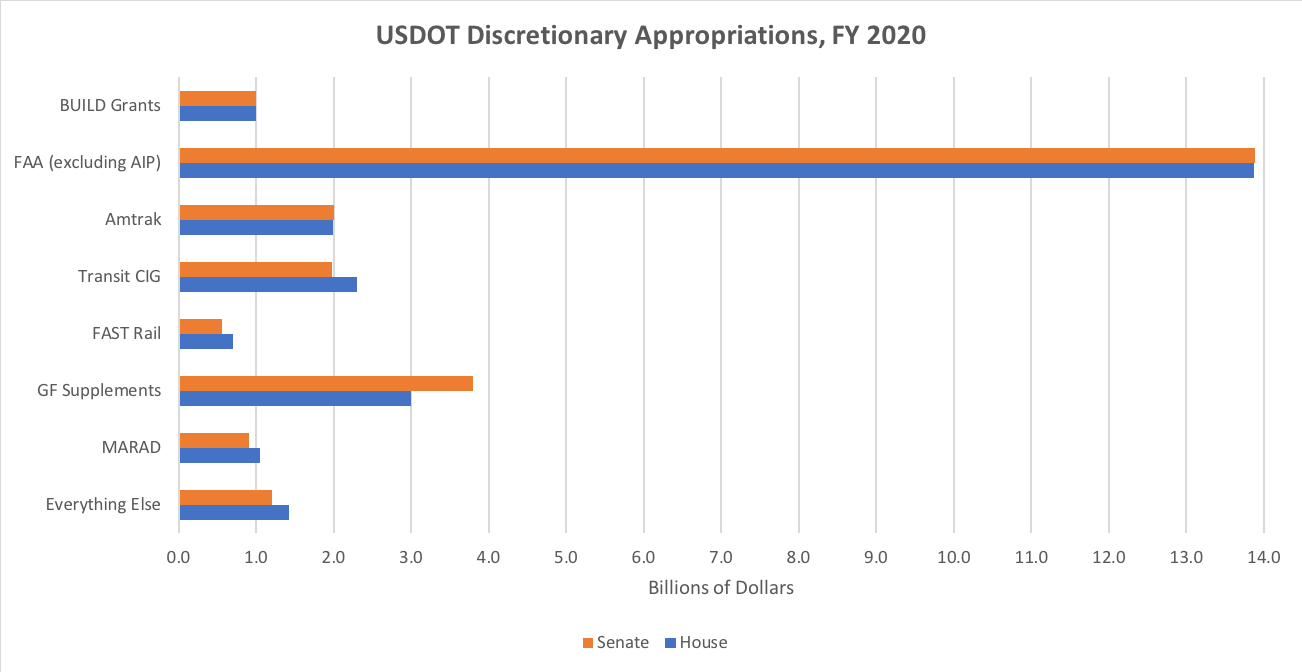The Senate Subcommittee on Transportation and Housing Appropriations made quick work of a draft appropriations bill for fiscal year 2020 this morning, forwarding it on to full committee consideration by voice vote. The full committee markup is scheduled for 10:30 a.m. on Thursday.
All the public information on the bill so far comes from a majority press release from chairman Susan Collins (R-ME) and a minority press release from ranking member Jack Reed (D-RI).
Total spending. The Senate bill provides $25.33 billion in net discretionary appropriations for 2020, which is a drop of $1.17 billion from the 2019 level. This is counteracted by a $1.33 billion increase in obligation limitations on contract authority, for a total discretionary resources total of $86.65 billion in the Senate bill, which is an increase of $168 million over the $86.48 billion enacted in 2019.
The gross amount of spending contained in the Senate bill will be at least a bit larger than that $25.33 billion total. In FY 2019, $189 billion in USDOT appropriations was offset from the gross total of $26.68 billion gross total – $142 million from offsetting pipeline safety fee collections, and $47 million from a one-time rescission of old mass transit funding. The CBO estimate for the 2020 pipeline safety fee receipts has now risen to $145 million in FY 2020, and we don’t know yet if the Senate bill has any offsetting rescissions. But the Senate’s net discretionary appropriation total for USDOT is almost exactly the same as that of the House bill as reported from committee, and that bill didn’t have any offsetting rescissions.
Priorities. Despite the fact that the House and Senate versions of the FY20 USDOT budget provide almost the exact same amount of net discretionary appropriations – $25.33 billion – the House and Senate bills have different priorities. The major categories of USDOT discretionary spending are shown in the comparative bar chart, below.

BUILD grants. The Senate bill provides a $1.0 billion appropriation for BUILD grants, the same as the House bill and the same as in 2019.
Aviation. The bill provides a total of $17.69 billion for the Federal Aviation Administration in 2020, which is $236 million above the fiscal year 2019 enacted level, $583 million above the President’s budget request, and $32 million below the fiscal year 2020 House bill. The obligation limitation of $3.350 billion on Airport Improvement Program contract authority stays the same as in prior years, and seems the appropriators have provided an additional $450 million or so out of the general fund for additional AIP grants. That leaves around $13.89 billion in discretionary appropriations to cover the three other FAA accounts, compared to $13.87 billion in the House bill and $13.60 billion in FY 2019. Within aviation, the press releases do say that funding for the aviation safety activity within Operations is increased to $1.359 billion.
Amtrak. The press releases say that the Senate bill provides $2.0 billion for grants to Amtrak. The House bill provided $1.992 billion to be precise, so the Senate total will be right around the House. The Senate bill rejects the Administration’s plan to wean Amtrak off of long-distance route subsidies using the FAST Act Restoration and Enhancement Grant program (see below).
Mass transit Capital Investment Grants. One of the larger differences between the House and Senate bills is the CIG program, which gets a $1.978 billion appropriation under the Senate bill, $324 million less than under the House bill. $1.1 billion will be required under both bills for CIG projects that already have signed full funding grant agreements. The House bill provided an additional $802 million for the FY 2020 installments of any new projects where the Secretary might sign a multi-year grant agreement, plus $430 million for one-off “small starts” and $50 million for the alternative delivery pilot program.
FAST Act rail grant programs. The Senate bill provides $557 million collectively for the three new passenger rail grant programs established by the FAST Act of 2015 – $255 million for the Consolidated Rail Infrastructure and Safety Improvement grants program, $300 million for Federal-State Partnership for State of Good Repair grants, and $2 million for Restoration and Enhancement grants. The House bill appropriated $700 million for these programs ($350 million apiece for the first two and zero for the last – the Trump Administration proposed $550 million for R&E in 2020 to make up for cuts to Amtrak long-distance routes).
General fund supplements to contract authority formula programs. Since the February 2018 budget deal, the Appropriations Committees have had so much money that they could supplement the highway, mass transit, and airport grant programs (which are funded with trust fund contract authority) with extra money from the general fund. These went from zero funding in 2017 to $4.4 billion per year in 2018 and 2019. Lower budget allocations mean that the FY 2020 amount drops to $3.0 billion in the House bill, but the Senate gives them $3.71 billion, as follows:

Now, take the highway and transit programming with a grain of salt – it is possible that the Senate may have put in a territory and Puerto Rico set-aside in the STBGP formula supplement without mentioning it in the press release. And the press release leaves out $10 million of the $560 million in mass transit funding, which could have been plugged in somewhere else. (If we get clarity, we will amend this later.)
Maritime. The Senate bill contains $904 million for the Maritime Administration, which is $149 million less than the House bill. Most of that difference comes out of the new port infrastructure grant program that the appropriators created in FY 2019 – it received $293 million in appropriations in FY19 and the House bill gives it $225 million in their FY20 bill, but the Senate bill only gives it $91.6 million (so that is $133 million of the $149 million difference right there). The security accounts gets the same $300 million it gets every year, and the press releases say that the bill also provides a full $300 million for replacement of another training ship for the state maritime academies.
More to come…





